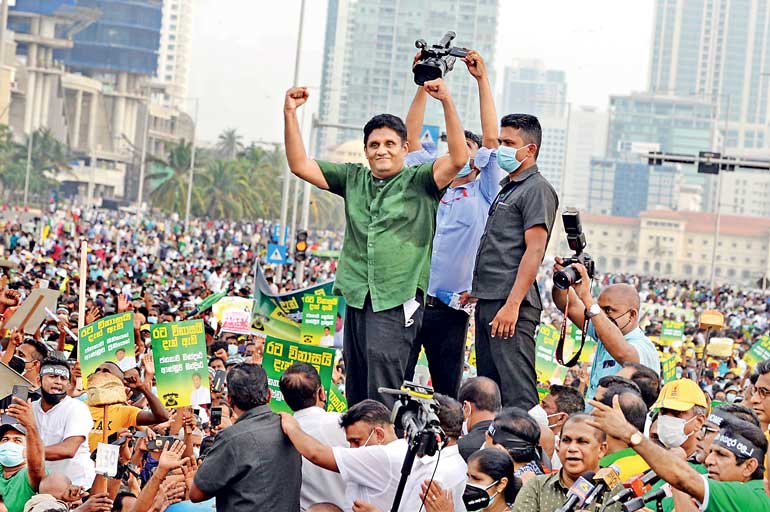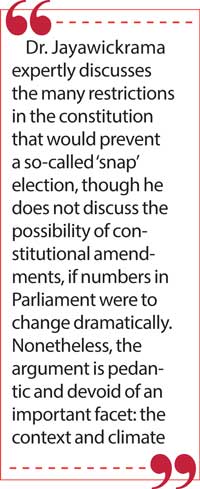Wednesday Feb 18, 2026
Wednesday Feb 18, 2026
Tuesday, 22 March 2022 03:01 - - {{hitsCtrl.values.hits}}

The main Opposition Party and its Leader Sajith Premadasa seem to have surprised many with the size, scope and sheer force of the public march to the Presidential Secretariat, as well as his call for a ‘snap’ presidential election – Pic by Shehan Gunasekara
By Kusum Wijetilleke
Economic collapse is no longer imminent, it has arrived. Make no mistake, a set of policy outcomes as disastrous as this would lead to mass anarchy in almost any other part of our region. Whatever Sri Lankan sense of pacifism or apathy is keeping the temperature just below boiling is unlikely to last for much longer. 
The protests and agitations of many thousands of ordinary Sri Lankans over the last year seemed to snowball into an awe-inspiring rally led by the Samagi Jana Balawegaya (SJB). That many independent Sri Lankans joined in, especially from within Colombo, was particularly encouraging. Al Jazeera reported ‘tens of thousands’ but whatever the official count, the stream of visceral anger was hard to miss, indeed the pictures of the march, broadcast nationally, must surely bring some hope to the masses around the country that there is a movement and it is gathering pace. Not everyone that reads an English daily in Colombo will appreciate this.
Our institutions and intellectuals have an obligation to respond to the desperation, to bring clarity to the conversation. Those with the necessary expertise must correct the record, not muddy the waters. Two major dailies carried an opinion piece by Dr. Nihal Jayawickrama on 18 March entitled “Irresponsible and unattainable demands”. Judging by the rush to criticism from predictable segments of the intellectual and media spectrum, the main Opposition Party and its Leader Sajith Premadasa seem to have surprised many with the size, scope and sheer force of the public march to the Presidential Secretariat, as well as his call for a ‘snap’ presidential election.
Dr. Jayawickrama expertly discusses the many restrictions in the constitution that would prevent a so-called ‘snap’ election, though he does not discuss the possibility of constitutional amendments, if numbers in Parliament were to change dramatically. Nonetheless, the argument is pedantic and devoid of an important facet: the context and climate.
This is President Gotabaya Rajapaksa’s party that is in power, it is his platform that has failed, his tax-cuts, his organic fertiliser policy; there is no one else that can take ownership of this set of outcomes. This President is the symbol of the Government and that is before we consider the 20th Amendment. Who else was the Opposition Leader supposed to challenge?
The media also has a sacred duty to report the facts as they stand. Crucially, this does not necessarily translate to taking a neutral position. The concept of neutrality is a sticky one. The study of Journalism from an academic standpoint, seems to have been distancing itself from this very concept upon which the entire field once depended on for its credibility. Martin Bell, a former British MP and BBC war reporter, once stated that he could no longer be sure what objectivity “means”. The Society of Professional Journalists removed the word ‘objectivity’ from its code of ethics sometime in the mid-90s.
The news media, in various parts of the world including in the West, has devolved into a soap-opera of personal opinion pieces and partisan editorials. The media in Sri Lanka, in many ways, has gone in the opposite direction. All major news segments on television carry the ‘misstatements’ of various politicians with little or no accompanying commentary, even when it is clearly necessary. In the past few weeks, there have been denials from officials regarding the lack of Dollars in the market, that there was shortage of fuel; one Cabinet Minister even stated that the power cuts were a conspiracy. The news media reported these statements with no caveat with regard to their accuracy.
The SJB has been accused, almost since the GR election victory, of being reticent, of being an unserious Opposition or engaging in its own internal scuffles instead of unifying a position against the Government. Yet at the mass rally, the Opposition, its Leader, and indeed their supporters, showed their teeth.
At the conclusion, Dr. Jayawickrama asks the question: “Instead, should he not mobilise public support to replace the autocratic system of government under which this country has almost reached its lowest depths?” If one measure of success of the protest march was its ability to “mobilise support”, then that data-set is clear. The crux of Dr. Jayawickrama’s argument is that any potential SP leadership project would seek to “perpetuate” the 20th Amendment and the all-powerful Executive Presidency: “an autocratic, outdated system of government which the leader of the SJB apparently wishes to perpetuate...”
On 18 March, the Opposition Leader attended a town-hall style question and answer session held by the Organization of Professional Associations (OPA), a union of professionals with over 52,000 members. Mr. Premadasa was asked a question regarding his views on the Executive Presidency and the answer was clear and unequivocal; he rejected the omnipotent nature and supreme powers of the Presidency under the 20th Amendment and stated that he would return to the 19th.
Crucially, he repeated what he stated in Parliament during the debates on 20A, that it would reduce the Prime Minister to a “scarecrow”, reiterating his desire that neither the President nor the Prime Minister should be reduced to a scarecrow. He referenced the Madisonian model as a structure of Government with its separation of the Executive, Legislature and Judiciary; considered necessary by James Madison and his contemporaries in order to prevent the absolute power and tyranny of either the minority or the majority.
What is also interesting to note: Many commentators that wish to abolish the Executive Presidency seek to replace it with what would essentially amount to an Executive Premiership. The results of the Ranilist version of such a system were not promising and did in fact lead to an all-powerful, singular individual.
To this end, Premadasa insisted that any future iteration of the 19A under his leadership would go beyond the previous 19A in terms of checks and balances; limitations on powers granted to an individual office, be it the President’s or the Prime Minister’s. This is an important distinction. What we are witnessing right now is a failure of a representative democracy, where policy does not in any shape or form reflect the needs of the people it claims to represent. No Westminster system will be able to protect Sri Lankans from a failure of representative democracy. Such a failure is not simply the result of a system, it is a culmination of decades of disinterest and apathy and subservience to power.
Perhaps the one positive result from the spectacular failure of the ‘Gota’ administration is that the extreme disintegration of lives and livelihoods will perhaps lead to an evolution of Sri Lankan society, becoming more politically engaged and less subjects to be ruled over.
Some sections of the media and the intellectual classes, seek to paint the Opposition Leader as power hungry, but this denies the evidence. As a party senior in the UNP, Premadasa always seemed to be below the top-rung of the UNP leadership, outside the establishment. He should have been able to insist on an electorate in the UNP stronghold of Colombo at some point during his career, opting instead to work in one of the most challenging
areas of the country.
Further, during previous challenges to Ranil Wickremesinghe’s leadership, despite every reason to court the leadership himself, Premadasa seemed willing to wait his turn. When President Maithripala Sirisena offered him the Premiership multiple times during the dying days of the Yahapalanaya regime, Premadasa refused that entry through cloak and dagger. These actions suggest a level of integrity that most commentators seem not to appreciate and certainly do not suggest a thirst for unmitigated power.
What we are witnessing at this precise moment cannot be surprising to political theorists familiar with the Iron Law of Oligarchy, a concept developed by the early 20th century Italian Sociologist Robert Michels. He predicted, over 100 years ago, that democratic systems have a tendency to lead to oligarchy due to the failure of representative democracy. When the representative aspect begins to deteriorate, that is when political agitation must begin; when the rubber meets the road and the people take to the street.
One must ask the question, why has the Presidential system persisted, from MR to MY3 to Gota; the people clearly hold on to the value of a President as a national custodian. It cannot be up to urbanised liberals to tell the masses what is best for them, that sort of diktat is rarely popular.
The SJB-led protest was an unmistakable cry for help from a desperate citizenry who were doing their bit as concerned and engaged citizens, not spectators but participants, as Noam Chomsky wrote in Consent without Consent (1998). The people interviewed during the daily news segments will tell anyone that will listen just how desperate they are. Everyone is doing whatever little they can to affect the system, to intensify that essential feedback loop on which a representative democracy functions. Even if it is as minor an intervention as a letter to a newspaper, if it contributes to the solution, it becomes essential; if it does not, it is simply more white noise that the public will ignore.
History is littered with movements that reach for the ‘unattainable’ and they are more often than not driven by little more than hope and optimism; giving people hope cannot be irresponsible, it would be irresponsible not to at least try.
(The writer could be reached via email at [email protected].)